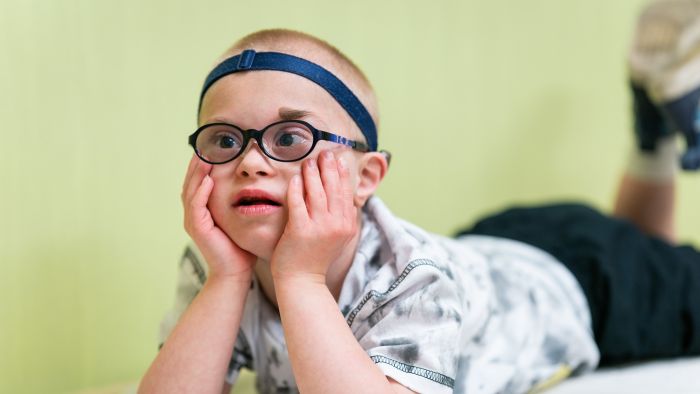The Gillette Children’s Sleep Health Clinic wants families of children who have Down syndrome to know they have resources to help with sleep concerns.
“There are two areas of stress that families are dealing with when it comes to good sleep and Down syndrome,” Gillette sleep medicine specialist, John Garcia, MD, says. “The first is obstructive sleep apnea and the second is insomnia. Our expert sleep medicine team can help with both and provide care for other sleep concerns.”
Dr. Garcia reports that many people who have Down syndrome often have issues with insomnia, including more fragmented sleep and frequent awakenings compared to typically developing children. Dr. Garcia says it’s important for families to know that there is help to improve sleep and to make sure children can be as well-rested as possible.
“We have old and new medications that can help with insomnia,” Dr. Garcia says. “Tried and true medications like trazodone, doxepin, clonidine, and hydroxyzine are often effective. Survorexant may help with insomnia. Children with all types of developmental disabilities have the most difficulty staying asleep, they wake up in the middle of the night.”
The first step for families struggling with sleep issues is to talk to a sleep doctor who can help decide whether a medication, a sleep study, or other therapies are indicated.
“When a parent notices their child chronically working harder to breathe, having breathing pauses, snoring persistently, waking more frequently for unexplained reasons, or sleeping more during the day, that’s a sign that this child should have their sleep evaluated,” Dr. Garcia suggests.
Gillette Has the "Gold Standard" in Sleep Programs
The American Academy of Sleep Medicine (AASM) reports the Gillette Children’s Sleep Health Clinic is one of the most well-run sleep labs its surveyor has ever reviewed. The AASM awarded Gillette a five-year re-accreditation demonstrating Gillette’s commitment to high quality, patient-centered care. Gillette has one of the nation’s only sleep medicine programs specifically designed for people who have disabilities or other complex health conditions.
Dr. Garcia says this special patient population makes Gillette different from other sleep clinics. “Simply put, our staff has to work harder and care more tenderly. Children with developmental disabilities pull off their electrographic sleep leads more frequently, are at more risk for falls, and have a variety of unpredictable behaviors,” Dr. Garcia says. “You name a stressor and the Gillette sleep techs have encountered it.”
Get Partners in Care Stories in your inbox!
Subscribe to Partners in Care Journal, a newsletter for healthcare providers and community health professionals.
Subscribe Today Home Page
Home Page



